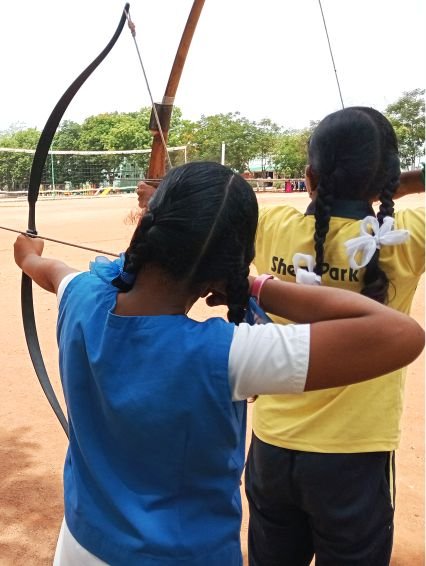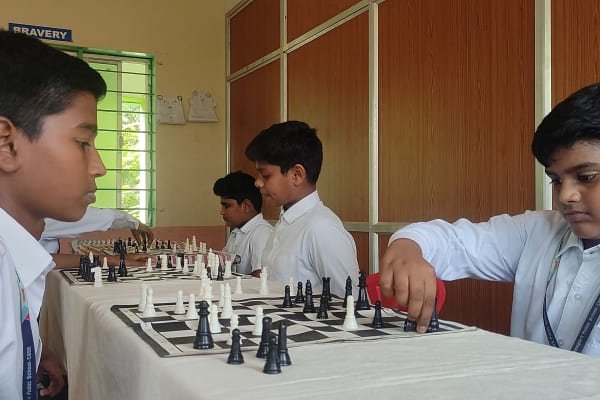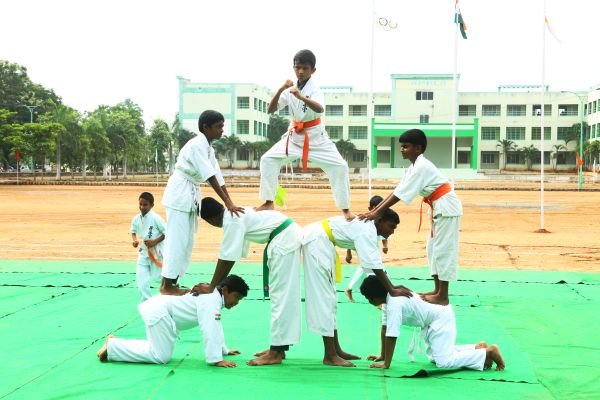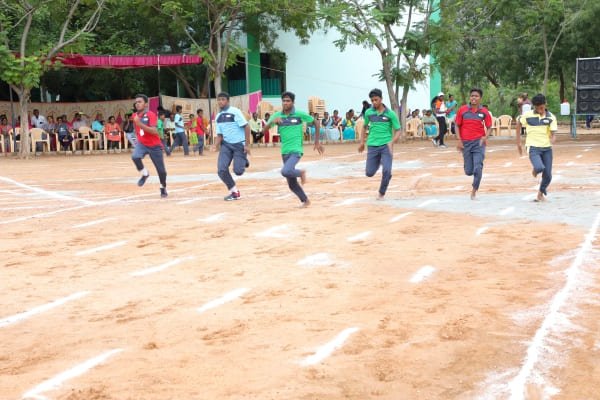Sports & Games




Sports & Physical Activities
We recognize the importance of physical fitness and sportsmanship in the overall development of children. Our school offers a variety of sports and physical activities to keep students active and engaged. These include:
Team Sports
Cricket, Football, Basketball, and Volleyball, promoting teamwork, discipline, and competitive spirit.
Individual Sports
Athletics, Tennis, Badminton, and Swimming, helping students develop focus, agility, and personal growth.
Mind Sports
Mind Sports in schools foster cognitive development and strategic thinking through games like chess, puzzles, and quizzes.
Physical Fitness Programs
Yoga and regular fitness sessions to promote mental well-being, flexibility, and stamina.

Sports & Physical Activities
We recognize the importance of physical fitness and sportsmanship in the overall development of children. Our school offers a variety of sports and physical activities to keep students active and engaged. These include:
Team Sports
Cricket, Football, Basketball, and Volleyball, promoting teamwork, discipline, and competitive spirit.
Individual Sports
Athletics, Tennis, Badminton, and Swimming, helping students develop focus, agility, and personal growth.
Mind Sports
Mind Sports in schools foster cognitive development and strategic thinking through games like chess, puzzles, and quizzes.
Physical Fitness Programs
Yoga and regular fitness sessions to promote mental well-being, flexibility, and stamina.

Team Sports:
These require cooperation among players to achieve a common goal. Examples include:
Football (Soccer):
Played globally, football is one of the most popular team sports.
Volleyball:
School volleyball fosters teamwork and discipline, bringing students together through spirited competition. It promotes physical fitness, coordination, and lasting friendships on and off the court.
Cricket:
A bat-and-ball game with two teams of eleven players each.

Individual Sports:
These are played solo and focus on personal achievement. Examples include:
Tennis:
Played between two players (singles) or teams of two (doubles) with rackets and a ball.
Athletics:
Includes running, jumping, and throwing events like the 100 meters, long jump, and shot put.

Mind Sports:
These rely more on mental acuity and strategy rather than physical effort. Examples include:
Chess:
A board game played between two players, aiming to checkmate the opponent's king.
Quiz:
Mind Sports in schools: Fostering critical thinking, strategy, and mental agility through games like chess, quizzes, and puzzles.
Benefits of Sports and Games

Engaging in sports and games offers a wide range of physical, mental, and social benefits:
- Physical Health:
- Regular participation in sports enhances cardiovascular health, strengthens muscles and bones, improves flexibility, and boosts the immune system.
- Physical activities like running, swimming, or playing football help in weight management and reduce the risk of chronic diseases like diabetes, hypertension, and heart disease.
- Mental Health:
- Sports can reduce stress and anxiety levels, improve mood, and boost mental well-being by releasing endorphins, the body’s natural “feel-good” chemicals.
- Competitive games stimulate cognitive functions such as decision-making, concentration, and memory.
- Social Benefits:
- Team sports, in particular, promote teamwork, communication, and collaboration.
- Playing sports fosters relationships, builds a sense of community, and encourages fair play and respect.
- Participation in games helps develop leadership skills, discipline, and the ability to work under pressure.
- Development of Skills:
- Many sports teach important life skills such as time management, resilience, goal-setting, and problem-solving.
- Sports also provide an opportunity for young people to develop social skills and teamwork, which are vital in both personal and professional settings.

Sports and games have evolved from traditional recreational activities to global phenomena that shape cultures, economies, and communities. Whether for health, entertainment, or competition, their impact is undeniable. In addition to physical fitness, sports encourage camaraderie, strategic thinking, and personal growth.
Engaging in sports and games is a vital part of life, helping individuals stay healthy, sharpen their minds, and develop lifelong friendships. From ancient civilizations to modern-day competitions, sports will continue to inspire and unite people worldwide for generations to come.
